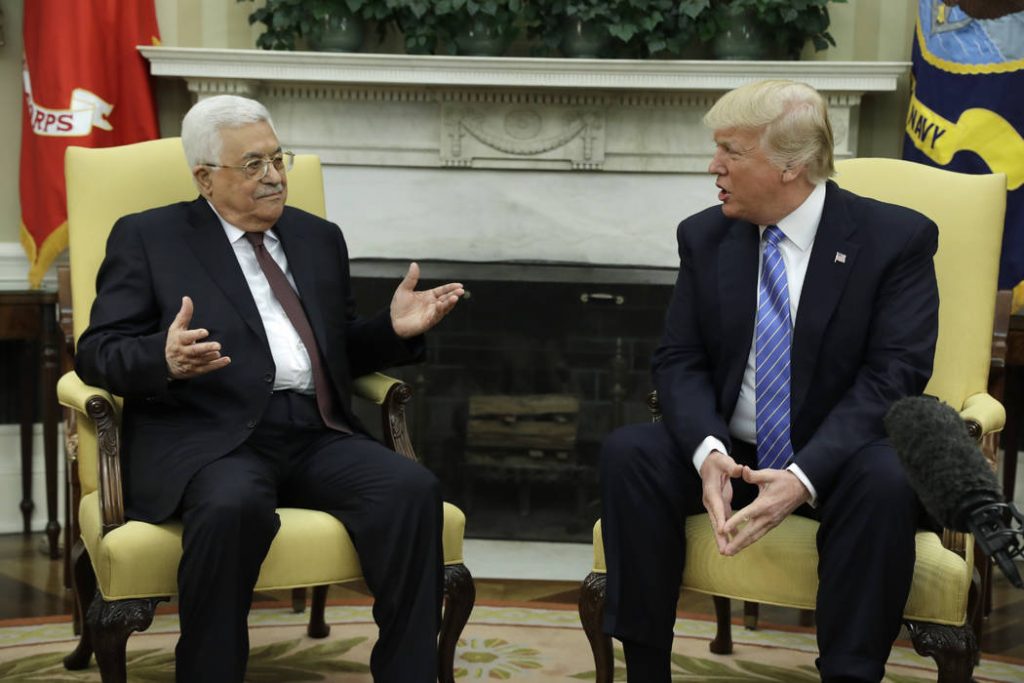- About Us
- Policy Center
- Learn
- Press Room
- Blog
- Get Involved
- Donate
- Donate to J Street Online
- Make a Gift in Someone’s Honor or Memory
- Make a Monthly Gift
- Tax-Deductible Donations
- Giving by mail
Palestinian President Mahmoud Abbas was greeted by President Trump at the White House today for the first meeting between the two leaders. While their discussions were private, they held a brief press availability.
Below, we try to answer some of your burning questions about Abbas’ visit, what was said today and why it matters.
A: Since entering office, President Trump and his administration have sent out mixed signals about how they plan to approach the Israeli-Palestinian conflict. The President has consistently emphasized his unwavering support for Israel and Prime Minister Netanyahu, and surrounded himself with advisers with ties to the Israeli right. But he has also been enthusiastic in his public outreach toward President Abbas and the Palestinian Authority, indicating that he views them as a serious partner for peace. This meeting was an opportunity to clarify how the Trump administration plans to move forward.

A: During the presidential campaign and since the inauguration, the president has spoken a lot about his desire for “the ultimate deal.” Last week, he told Reuters, “I want to see peace with Israel and the Palestinians. There is no reason there’s not peace between Israel and the Palestinians — none whatsoever.” In meetings with leaders of Arab states, the president has put the resolution of the conflict near the top of the agenda. And presidential envoy Jason Greenblatt has been on the ground emphasizing Trump’s interest in peace, meeting with Israeli and Palestinian officials along with religious and civil society leaders.
On the other hand, the administration has yet to put out a clear plan for a peace process — and the president has confused many by refusing to clearly state his support for the two-state solution. The administration has also remained silent about recent Israeli announcements of new settlement construction, and has nominated a US ambassador to Israel with close ties to the settlement movement — raising questions about how willing this president is to challenge both sides to make compromises.
A: He did not. While Abbas made clear that he supports a negotiated two-state solution to end the conflict, Trump avoided any clear declaration of support for the two-state solution or a Palestinian state. While the president seems serious in his determination to help facilitate a successful peace process, his reticence on two states is confusing. The two-state formula has long been accepted by Palestinian and Israeli leaders, the international community and US presidents from both political parties as the only viable way to end the conflict. As long as Trump refrains from publicly backing it, his plan to help end the conflict remains unclear.
A: Trump was effusive in his praise for the Palestinian Authority’s security cooperation with Israel, which helps keep Israelis safe from terrorism. That’s particularly notable because some Republicans in Congress are pushing legislation that would cut off funding to the Palestinian Authority, potentially undermining this cooperation. As Israeli security officials have pointed out, depriving the PA of funding would seriously undermine their security cooperation efforts — and greatly increase the danger to Israelis. Trump’s support for the PA’s efforts indicates that he understands the complexity of the issue and the vital role of the Palestinian security forces.
A: The Palestinian president came into the meeting facing his own difficult political situation at home. As Palestinian frustration grows over the lack of progress toward peace and the occupation entering its 50th year, he faces pressure from some members of his Fatah party who would like to take a more confrontational approach toward the Israeli government. Marwan Barghouti — a well-known Fatah leader imprisoned by Israel since 2002 for his involvement in terrorist attacks that killed 5 people — has recently raised his profile by leading Palestinian prisoners in a hunger strike, seen by some as challenging Abbas’ authority and popularity.
Tensions are also ratcheting up over the situation in Gaza. Abbas has recently sought to put pressure on Hamas by suspending the Palestinian Authority’s funding of Israeli-supplied electricity to the Gaza Strip. That could help undermine Hamas’ already shaky rule there — but also risks exacerbating an already severe humanitarian and economic crisis.
The Palestinian president was likely hoping to take home some signs that a serious US-led peace process is in the offing which could help boost his standing in his own party and among the Palestinian public.